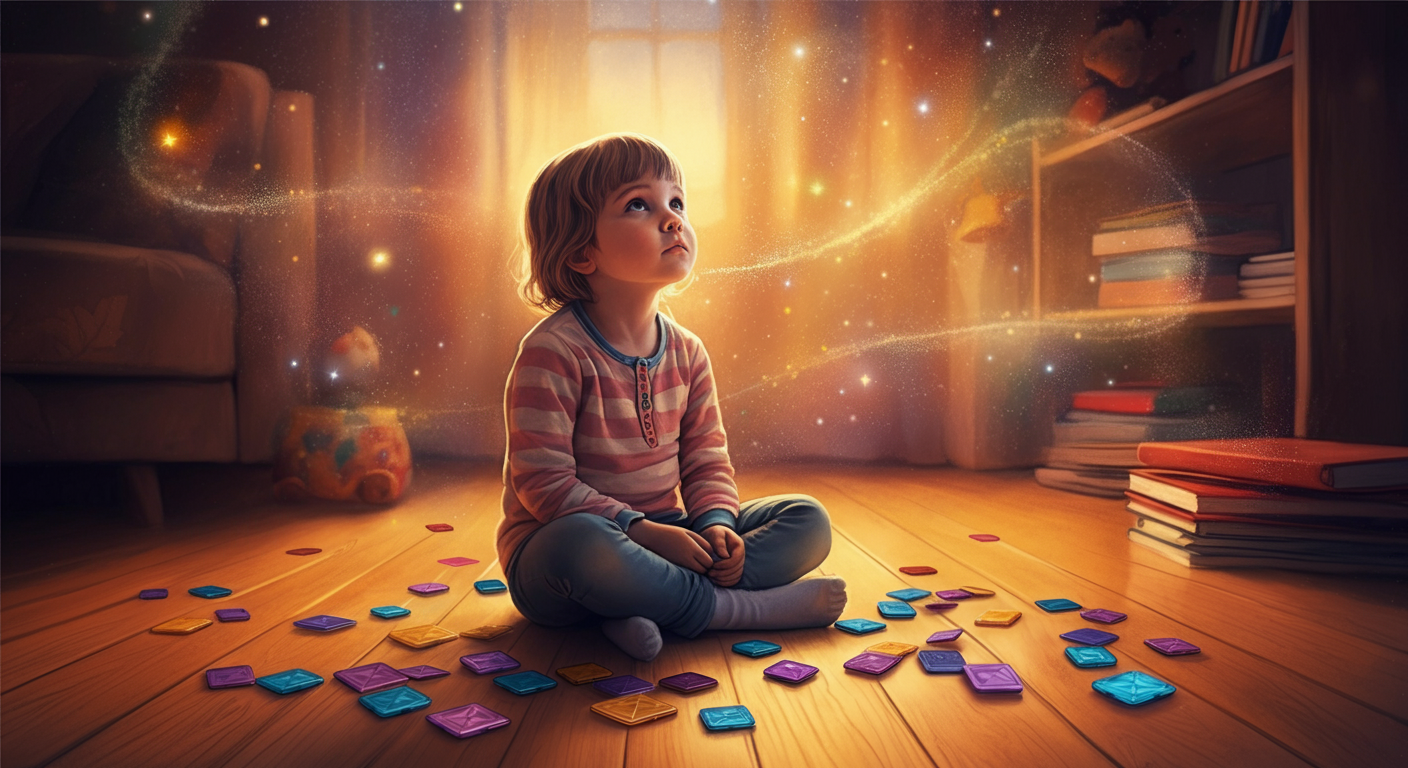Conversations with the Other Angela
"When people are dead they can still talk," Roy announces. I ask if he talks to dead people. "Yes. Angela. But not you, another Angela." Then he stops answering questions, leaving me to wonder who this other Angela might be.

"When people are dead they can still talk," my then 3-year-old announces, out of nowhere, while playing with his magnetic tiles.
I look up from my book. "Do you talk to dead people?"
"Yes."
"Like who?"
"Angela. But not you, another Angela."
And then he declines to answer any more questions, returning to his construction as if he hadn't just opened a door to something both wonderful and weird.
Processing the Big Questions
This conversation didn't happen in isolation. Yesterday, driving to school, he asked equally suddenly: "What does die mean?"
He's been using the word "die" in play for months - dinosaurs die, characters in stories die, batteries die. But he wasn't sure what it truly meant in real life, I think. Or wasn't sure of its significance. We talked about lifecycles, about death being a natural stage like all the others, about doing our best to live fully before that time comes.
"I don't want to die," he said.
"You don't need to worry about that for a very long time," I replied. "The important thing is that we take good care of ourselves and do our living."
He seemed satisfied with this, but clearly, he's been thinking.
The Other Angela
Who is this other Angela he speaks with?
The matter-of-fact way he mentioned her suggests she's not a frightening presence. Just another person he talks to, who happens to be dead. Someone who shares my name but isn't me.
Part of me wants to ask more questions, but the immediate shutdown suggests this isn't information he's currently willing to share. Three-year-olds often know exactly how much they want to reveal about their internal worlds.
Other Mysterious Announcements
This kiddo regularly says things that stop me in my tracks.
There's a particular road he dislikes because, he tells me, "You're going to crash into the trees there." The certainty in his voice is unsettling, though I try to treat it as imagination while making mental notes about defensive driving.
He sometimes talks about being lost in a forest, unable to find his mum and dad. He speaks about this with such authentic emotional depth that it feels like memory rather than fantasy. But when? Where? It's not an experience we've shared, yet it clearly matters to him.
The Rainbow Origin Story
Not all of the mysterious pronouncements are eerie. Some are purely wonderful.
"Who made you?" he asked me the other day.
"My Mum and Dad. Do you know who made you?"
"Yep. It was a rainbow."
He went on to explain that the rainbow made him special and gave him special eyes. "Aren't they beautiful?" he asked.
All I could do was agree, because everything he said felt accurate.
The next day he wanted me to tell him the story of how the rainbow made him. So, I created a tale about how his Dad and I wished on stars and moon and clouds, hoping for him to join us. Then came an amazing rainbow, and we wished on that too. The rainbow gave us a golden egg, which we cared for as it grew into him.
He was deeply satisfied with this story, as if it confirmed something he already knew.
The Latest Request
Just now he came over, leaned in close, and whispered conspiratorially: "Mum. I want a robot baby."
What I'm Learning
Three-year-olds exist in a space between logical thinking and magical understanding. They're processing enormous concepts - life, death, identity, family, existence itself - with limited vocabulary but unlimited imagination.
My little boy's conversations with the other Angela, his rainbow origin story, his forest memories, and his robot baby desires all seem to serve the same function: making sense of a world that contains mysteries.
I don't think I'm supposed to solve these mysteries or explain them away. My role seems to be listening, answering the questions I can answer, and creating space for the ones that don't have answers yet.
The Practical Response
When my baby mentions the other Angela, I acknowledge it without alarm. When he asks about death, I provide age-appropriate honesty. When he tells me about rainbows making him special, I affirm his sense of wonder about his own existence.
I'm not trying to convince him that dead people can't talk or that rainbows don't make babies. Instead, I'm trying to be a safe person to think out loud with, someone who takes his questions seriously while helping him navigate the difference between imagination and practical reality.
The robot baby request, though? That one might require more discussion.
The Mystery Remains
I still don't know who the other Angela is. He hasn't mentioned her again, though I suspect she's still part of his world.
Maybe that's okay. Maybe some mysteries are meant to belong to the people experiencing them, at least for now.
What I do know is that this is a child who is thinking deeply about existence, identity, and connection. The conversations with the other Angela, whoever she is, seem to be part of that processing.
And somehow, that feels both completely normal and quietly extraordinary.